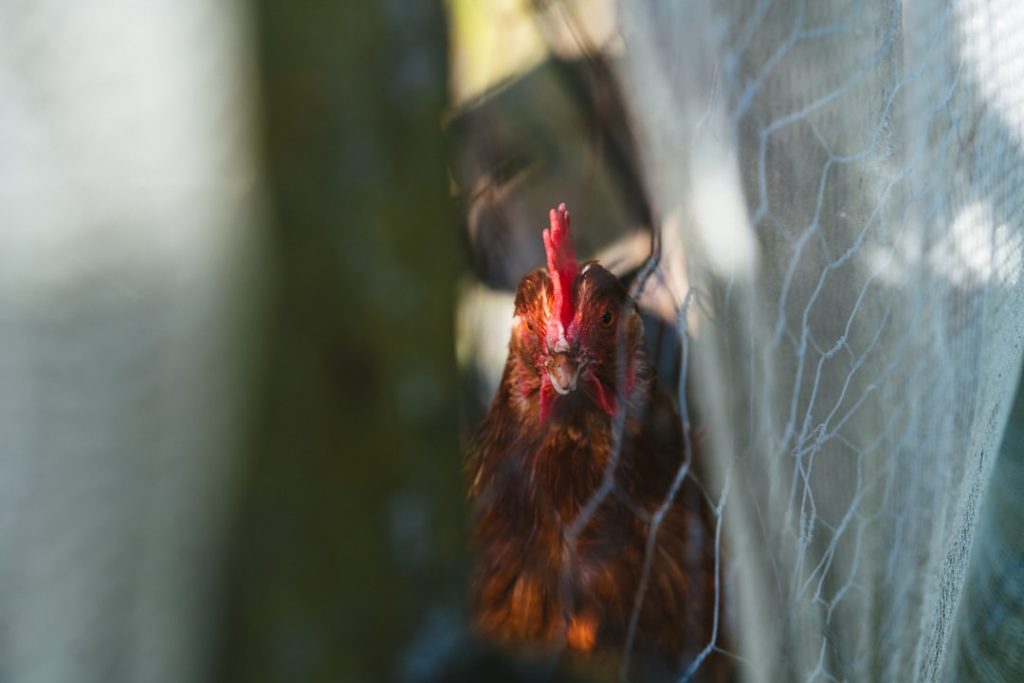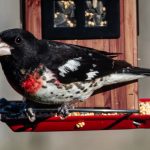Chickens are naturally drawn to bird feeders for multiple reasons. Bird feeders often contain seeds and grains that are part of a chicken’s diet. As opportunistic eaters, chickens will consume almost anything they encounter, including food intended for wild birds.
The activity and movement around bird feeders also attract chickens due to their innate curiosity. They tend to investigate any source of commotion or movement in their surroundings. The presence of other birds at feeders can also entice chickens, as they may view it as an opportunity for socialization or food competition.
The accessibility of food is another factor that attracts chickens to bird feeders. These feeders are typically placed in open areas, making them easily visible and accessible to chickens. Certain feeder designs, such as platform or tray feeders, are particularly easy for chickens to access.
Furthermore, the regular replenishment of bird feeders by humans creates a reliable food source, encouraging chickens to return to the same location repeatedly.
Table of Contents
- 1 Implementing Physical Barriers to Keep Chickens Away
- 2 Using Scent and Taste Deterrents to Repel Chickens
- 3 Creating Distractions to Redirect Chickens’ Attention
- 4 Properly Storing and Disposing of Bird Feed to Prevent Chicken Attraction
- 5 Enlisting the Help of Other Animals to Keep Chickens at Bay
- 6 Seeking Professional Help and Advice for Persistent Chicken Problems
- 7 FAQs
- 7.1 What are some effective ways to keep chickens away from bird feeders?
- 7.2 Why is it important to keep chickens away from bird feeders?
- 7.3 Are there any natural deterrents that can be used to keep chickens away from bird feeders?
- 7.4 Can training or conditioning be used to keep chickens away from bird feeders?
- 7.5 What are some common mistakes to avoid when trying to keep chickens away from bird feeders?
Key Takeaways
- Chickens are attracted to bird feeders because they are drawn to the seeds and grains found in the feed.
- Implement physical barriers such as wire mesh or fencing to keep chickens away from bird feeders.
- Use scent and taste deterrents like citrus peels or hot pepper spray to repel chickens from bird feeders.
- Create distractions such as scattering scratch grains or setting up a separate feeding area for chickens to redirect their attention.
- Properly store and dispose of bird feed to prevent chicken attraction by keeping it in sealed containers and cleaning up spilled feed.
- Enlist the help of other animals like dogs or predatory birds to keep chickens at bay from bird feeders.
- Seek professional help and advice if chicken problems persist despite trying various deterrent methods.
Implementing Physical Barriers to Keep Chickens Away
Physical Barriers
One effective way is by implementing physical barriers. This can be achieved by using wire mesh or netting to enclose the bird feeder, making it inaccessible to chickens. Another option is to install a dome or baffle above the feeder to prevent chickens from reaching the food from above.
Elevated Feeders
Additionally, placing the bird feeder on a tall pole or stand can also help keep it out of reach of chickens. This simple yet effective method can be used in conjunction with other deterrents for added protection.
Motion-Activated Deterrents
Another physical barrier that can be used is a motion-activated deterrent, such as a sprinkler system or noise-making device. These deterrents can startle and discourage chickens from approaching the bird feeder, making it less appealing for them to visit.
Designated Feeding Areas
Furthermore, creating a designated feeding area for wild birds that is enclosed with chicken wire or fencing can help keep chickens away from the main bird feeder. This method not only keeps chickens away but also provides a safe and exclusive space for wild birds to feed.
Using Scent and Taste Deterrents to Repel Chickens

In addition to physical barriers, scent and taste deterrents can also be effective in repelling chickens from bird feeders. One common method is to sprinkle cayenne pepper or hot sauce around the base of the bird feeder. The strong scent and taste of these substances can deter chickens from approaching the feeder, as they will find it unpleasant and avoid the area altogether.
Another option is to use citrus peels or essential oils with strong scents, such as lemon or orange, which can have a similar effect on chickens. Another scent deterrent that can be used is predator urine, such as that of foxes or coyotes. These scents can create a sense of danger for chickens, causing them to stay away from the area around the bird feeder.
Additionally, there are commercial repellent sprays available that are specifically designed to deter chickens and other pests from bird feeders. These sprays often contain natural ingredients with strong scents that are unpleasant to chickens, effectively keeping them at bay.
Creating Distractions to Redirect Chickens’ Attention
Redirecting chickens’ attention away from bird feeders can also be an effective strategy for keeping them at bay. One way to do this is by providing alternative sources of food for the chickens in a different location. This can be achieved by setting up a separate feeding area for the chickens with their own food supply, such as grains or kitchen scraps.
By providing an alternative food source, chickens may be less inclined to visit the bird feeder in search of food. Another method of creating distractions is by introducing visual deterrents around the bird feeder. This can include hanging shiny objects, such as CDs or reflective tape, near the feeder to create movement and reflections that can startle and deter chickens.
Additionally, placing decoy predators, such as fake owls or hawks, near the bird feeder can create a sense of danger for chickens, causing them to avoid the area altogether.
Properly Storing and Disposing of Bird Feed to Prevent Chicken Attraction
Properly storing and disposing of bird feed is crucial in preventing chicken attraction to bird feeders. Storing bird feed in secure containers that are inaccessible to chickens can help prevent them from accessing the food directly. This can include using metal or plastic bins with tightly sealed lids to store the bird feed when not in use.
Additionally, keeping the storage area clean and free of spilled seeds or grains can help reduce the likelihood of attracting chickens. Proper disposal of uneaten bird feed is also important in preventing chicken attraction. Any spilled or uneaten bird feed should be promptly cleaned up and disposed of in a secure manner, such as in a sealed trash bin or compost pile that is inaccessible to chickens.
This will help eliminate any lingering food sources that may attract chickens to the area around the bird feeder.
Enlisting the Help of Other Animals to Keep Chickens at Bay

Predator Presence
Enlisting the help of other animals can be an effective way to keep chickens at bay and prevent them from accessing bird feeders. One option is to introduce predator animals, such as dogs or cats, into the area around the bird feeder. The presence of these predators can create a sense of danger for chickens, causing them to avoid the area altogether.
Breeds of Dogs as Deterrents
Certain breeds of dogs are known for their ability to deter and chase away chickens, making them an effective deterrent for keeping chickens away from bird feeders.
Introducing Aggressive Birds
Another option is to introduce other birds into the area that are known to be aggressive towards chickens, such as geese or turkeys. These birds can help establish a pecking order and assert dominance over the chickens, making them less likely to approach the bird feeder.
Creating Competition
Additionally, introducing non-threatening birds, such as ducks or quail, into the area can create competition for food and space, making it less appealing for chickens to visit.
Seeking Professional Help and Advice for Persistent Chicken Problems
In some cases, persistent chicken problems may require professional help and advice to effectively address the issue. Consulting with a local agricultural extension office or poultry expert can provide valuable insights and recommendations for managing chicken attraction to bird feeders. These professionals can offer guidance on effective deterrent methods and strategies tailored to specific chicken behaviors and environmental factors.
Another option is to seek assistance from pest control professionals who specialize in managing wildlife and poultry-related issues. These professionals can assess the situation and recommend targeted solutions for deterring chickens from bird feeders while minimizing impact on other wildlife and domestic animals in the area. Furthermore, reaching out to local poultry or farming communities can provide access to valuable resources and support networks for addressing persistent chicken problems.
These communities may offer practical advice and firsthand experiences in managing chicken attraction to bird feeders, helping individuals develop effective strategies for long-term success. In conclusion, understanding why chickens are attracted to bird feeders is essential in developing effective strategies for keeping them at bay. Implementing physical barriers, scent and taste deterrents, creating distractions, properly storing and disposing of bird feed, enlisting the help of other animals, and seeking professional advice are all valuable approaches for managing chicken attraction to bird feeders.
By employing a combination of these strategies and adapting them to specific environmental factors and chicken behaviors, individuals can effectively deter chickens from accessing bird feeders while promoting coexistence with other wildlife in their surroundings.
If you’re struggling to keep chickens away from your bird feeder, you may want to consider building a secure chicken coop to keep them contained. Poultry Wizard offers a variety of coop designs, including the A-Frame Chicken Coop, Farmhouse Chicken Coop, and Snaplock Chicken Coop. These coops can help keep your chickens from wandering into areas where they shouldn’t be, such as around your bird feeder.
FAQs
What are some effective ways to keep chickens away from bird feeders?
Some effective ways to keep chickens away from bird feeders include using physical barriers such as chicken wire or fencing, using motion-activated deterrents, and providing a separate feeding area for the chickens.
Why is it important to keep chickens away from bird feeders?
It is important to keep chickens away from bird feeders because they can consume the bird seed, potentially spreading diseases to wild birds, and can also damage the feeders with their pecking and scratching behavior.
Are there any natural deterrents that can be used to keep chickens away from bird feeders?
Yes, there are natural deterrents that can be used to keep chickens away from bird feeders, such as planting certain herbs and flowers that chickens find unappealing, or using citrus peels or vinegar as a repellent.
Can training or conditioning be used to keep chickens away from bird feeders?
Yes, training or conditioning can be used to keep chickens away from bird feeders. This can be done by consistently redirecting the chickens to a separate feeding area and rewarding them for staying away from the bird feeders.
What are some common mistakes to avoid when trying to keep chickens away from bird feeders?
Some common mistakes to avoid when trying to keep chickens away from bird feeders include using harmful or toxic deterrents, neglecting to provide an alternative feeding area for the chickens, and not addressing the root cause of the behavior, such as boredom or lack of proper nutrition.
Meet Walter, the feathered-friend fanatic of Florida! Nestled in the sunshine state, Walter struts through life with his feathered companions, clucking his way to happiness. With a coop that’s fancier than a five-star hotel, he’s the Don Juan of the chicken world. When he’s not teaching his hens to do the cha-cha, you’ll find him in a heated debate with his prized rooster, Sir Clucks-a-Lot. Walter’s poultry passion is no yolk; he’s the sunny-side-up guy you never knew you needed in your flock of friends!







